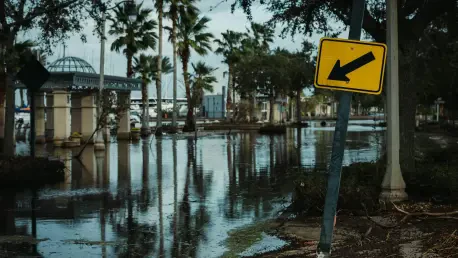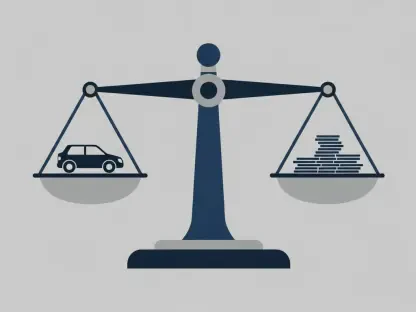What happens when a home, a sanctuary of safety, turns into a battleground over a few inches of water? In Tupelo, Mississippi, Marcus and Angela Clegg found themselves wading through not just flood damage but a frustrating fight with their insurer, Liberty Mutual. Their story begins with a clogged air conditioning drain line in August 2024, a minor issue that spiraled into major destruction, leaving their property soaked and their trust in insurance shaken. What should have been a straightforward claim became a federal lawsuit, filed earlier this year, exposing raw tensions between homeowners and the companies meant to protect them. This isn’t just about one couple—it’s a glimpse into a struggle many face when disaster strikes.
Why This Fight Matters
The Cleggs’ legal battle, lodged in the US District Court for the Northern District of Mississippi on August 14 of this year, isn’t merely a personal grievance. It underscores a pervasive issue: the gap between what policyholders expect and what insurers deliver during crises. With homeownership often tied to financial stability, a denied or underpaid claim can unravel years of planning. This case, involving allegations of delays and insufficient payouts, mirrors complaints echoing across the country, where nearly 30% of homeowners report feeling shortchanged on claims, according to a 2023 industry survey. Their story demands attention because it questions whether insurance, marketed as a safety net, holds up under pressure.
Beyond the numbers, this dispute highlights the human toll of bureaucratic tangles. The emotional weight of rebuilding a damaged home while wrestling with corporate red tape is a burden no one anticipates when signing a policy. As this lawsuit unfolds, it could set a precedent for how insurers handle similar claims in Mississippi and beyond, potentially reshaping trust in an industry that thrives on promises of security.
A Home Under Water, A Claim Underwater
The trouble started innocently enough for the Cleggs when a blocked air conditioning drain line unleashed havoc in their Tupelo residence last August. Water seeped into walls and floors, turning their living space into a soggy mess. They acted swiftly, notifying Liberty Mutual and its affiliates, Safeco Insurance and American Economy Insurance, expecting prompt support. Instead, they encountered what they describe in court filings as a wall of delays, with the insurer dragging its feet on processing their urgent request for help.
When a response finally came, it was far from reassuring. In a letter dated August 26, 2024, Liberty Mutual labeled the incident a “plumbing failure” and offered a mere $11,857.80 for repairs—a figure that stunned the couple. Independent estimates from local vendors painted a grimmer picture: Johnson Carpet quoted $176,083.89, while Newman Floor Covering pegged costs at $180,738.00. Having already shelled out $159,324.53 on repairs, backed by detailed receipts, the Cleggs found themselves footing a massive bill while the insurer held firm on its meager payout.
Their frustration boiled over into legal action, with claims that Liberty Mutual not only underpaid but also mishandled the process through inconsistent communication and unnecessary demands for documentation. A reservation of rights letter on October 17, 2024, further muddied the waters, leaving them feeling dismissed. The lawsuit accuses the insurer of breaching their Safeco policy and violating Mississippi’s Policyholder’s Bill of Rights, alleging bad faith and seeking punitive damages alongside full compensation.
Echoes of Discontent in a Wider Arena
The Cleggs’ grievances resonate with a chorus of dissatisfaction heard nationwide among homeowners grappling with insurance disputes. Court documents reveal their exasperation over what they call stonewalling tactics, like repeated requests for paperwork they’d already submitted. While Liberty Mutual has yet to respond publicly to these specific allegations, and no court decisions have been issued, the couple’s plight aligns with broader trends. Industry experts point out that disputes often hinge on murky policy terms—such as the distinction between “plumbing failure” and “water damage”—leaving clients bewildered and undercompensated.
This isn’t a solitary struggle but part of a systemic challenge. Reports indicate that delays and lowball offers plague many claims, with some policyholders waiting months for resolution. In Mississippi, where state regulations aim to safeguard consumers, gaps in enforcement or clarity still leave room for conflict. The Cleggs’ case might just be the spark needed to ignite deeper scrutiny of how insurers interpret policies and interact with those they’re bound to protect.
Lessons From the Flood: Navigating Claims With Caution
For homeowners watching this saga unfold, the Cleggs’ experience offers a stark reminder to tread carefully when filing insurance claims. One critical step is meticulous documentation—every photo of damage, every repair receipt, and every email exchange can bolster a case. The couple’s ability to present concrete figures, like their $159,324.53 in expenses, strengthens their argument against the insurer’s low offer.
Equally vital is understanding policy details before disaster hits. Terms like “plumbing failure” can become sticking points, so reviewing coverage with an agent or legal advisor can prevent surprises. Seeking independent estimates, as the Cleggs did with local vendors, also provides leverage to challenge inadequate payouts. Knowing state protections, such as Mississippi’s consumer rights laws, empowers policyholders to demand fair treatment and, if needed, escalate issues through legal channels or state insurance departments.
Reflections on a Soaked Struggle
Looking back, the ordeal of Marcus and Angela Clegg stands as a poignant chapter in the ongoing clash between individual homeowners and towering insurance entities. Their fight, rooted in a flooded home, grew into a federal lawsuit that captured the frustrations of many who felt betrayed by the very systems meant to shield them. It wasn’t just about recouping financial losses; it became a stand for accountability and clarity in an industry often criticized for opacity.
As their case lingers in court, it prompts a vital conversation about strengthening consumer protections and ensuring insurers honor their commitments without dragging vulnerable families through prolonged disputes. Moving forward, homeowners are encouraged to arm themselves with knowledge—reading the fine print, documenting every step, and seeking support from state resources when claims falter. The hope remains that stories like theirs will push for reforms, making the promise of insurance a reality rather than a gamble for those rebuilding after disaster.









